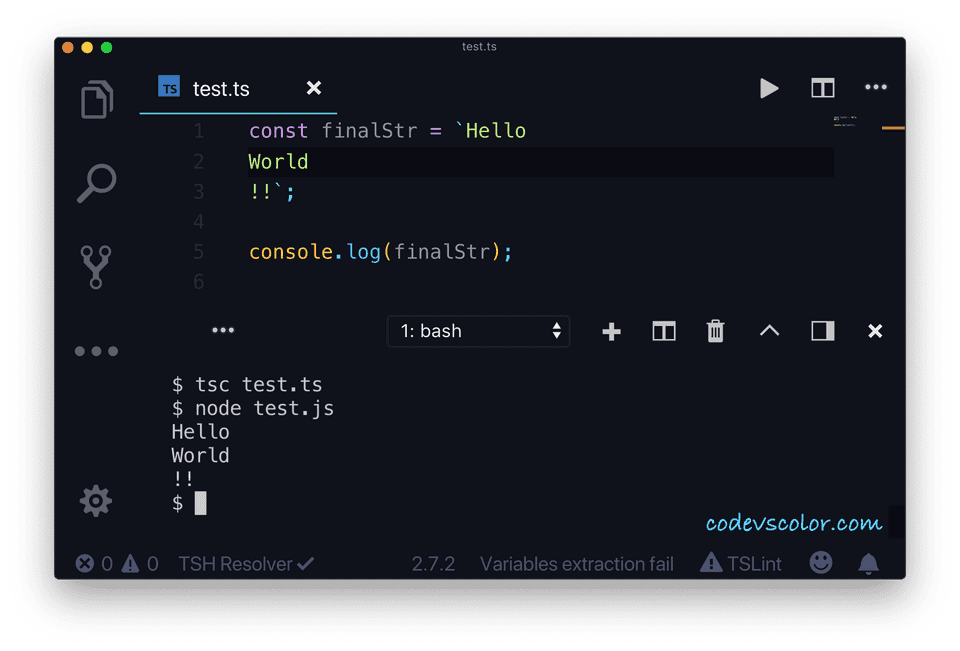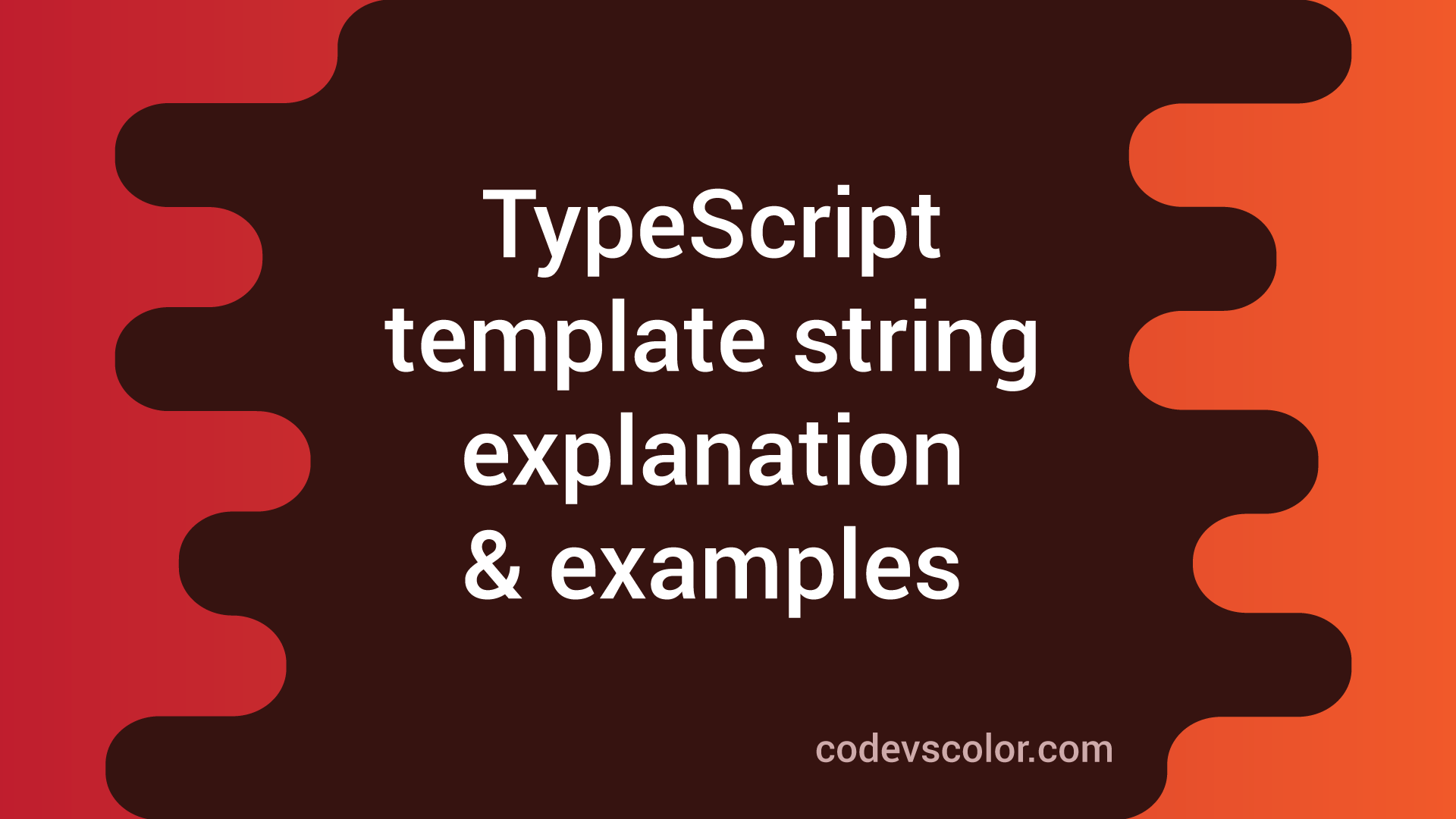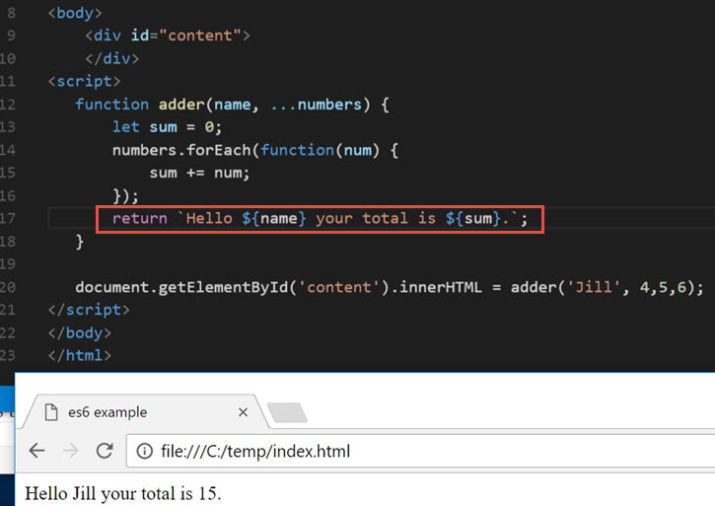Typescript String Templating
Typescript String Templating - String) { switch (intrinsictypekinds.get(symbol.escapedname as string)) { case intrinsictypekind.uppercase: These string literal types, in turn, can be used as. Web template literals are string literals allowing embedded expressions. In order to use jsx you must do two things. Web template literal types string literal types in typescript allow us to model functions and apis that expect a set of specific strings. Template literals can be used to extract and manipulate string literal types. String is another primitive data type that is used to store text data. Web another common use case is when you want to generate some string out of some static strings + some variables. The main difference is that. Web the typescript tagged templates allow us to tag template strings or template literals using a function (tagged function). String is another primitive data type that is used to store text data. Web template strings are used mainly for three purposes : For example, typescript now allows us to. As your template string must get reference to the b variable dynamically (in runtime), so the answer is: Web the typescript tagged templates allow us to tag template strings or. In order to use jsx you must do two things. Const string = i'm just a string; As your template string must get reference to the b variable dynamically (in runtime), so the answer is: String is another primitive data type that is used to store text data. Web template literal types string literal types in typescript allow us to. Web template strings in typescript are borrowed from templating engines used mainly with server side web frameworks to create templates.in this tutorial we have seen. Web typescript supports embedding, type checking, and compiling jsx directly to javascript. Web // a common string as reference. Web template literal types string literal types in typescript allow us to model functions and apis. Web by taking “template literal strings” from javascript as inspiration, you can apply the same syntax for your literal types in typescript. Template literals can be used to extract and manipulate string literal types. String is another primitive data type that is used to store text data. Web template strings are used mainly for three purposes : Web typescript 4.4. Web learn about string data type in typescript. For this you would need some templating logic and this is. String is another primitive data type that is used to store text data. For programs to be useful, we need to be able to work with some of the simplest units of data: As your template string must get reference to. String) { switch (intrinsictypekinds.get(symbol.escapedname as string)) { case intrinsictypekind.uppercase: Web // a common string as reference. Web string manipulation with template literals. Web typescript 4.4 addresses these limitations, and allows index signatures for symbols and template string patterns. Web another common use case is when you want to generate some string out of some static strings + some variables. Template string for interpolation : These string literal types, in turn, can be used as. Numbers, strings, structures, boolean values, and the like. As your template string must get reference to the b variable dynamically (in runtime), so the answer is: The main difference is that. Template literals can be used to extract and manipulate string literal types. For this you would need some templating logic and this is. String is another primitive data type that is used to store text data. Web template strings are used mainly for three purposes : Web another common use case is when you want to generate some string out. Web another common use case is when you want to generate some string out of some static strings + some variables. These string literal types, in turn, can be used as. Web intro to template literals typescript already supports treating an exact string/number as a literal, for example this function only allows two exact strings and no others: String) {. Web template strings are used mainly for three purposes : For this you would need some templating logic and this is. Web typescript 4.4 addresses these limitations, and allows index signatures for symbols and template string patterns. Web another common use case is when you want to generate some string out of some static strings + some variables. Const string. For this you would need some templating logic and this is. String) { switch (intrinsictypekinds.get(symbol.escapedname as string)) { case intrinsictypekind.uppercase: Web template strings are used mainly for three purposes : No, it's impossible to do it without dynamic code. Web string manipulation with template literals. Template literals can be used to extract and manipulate string literal types. Const string = i'm just a string; Web intro to template literals typescript already supports treating an exact string/number as a literal, for example this function only allows two exact strings and no others: Template string for interpolation : Web another common use case is when you want to generate some string out of some static strings + some variables. For example, typescript now allows us to. The main difference is that. Name your files with a.tsx. Web typescript 4.4 addresses these limitations, and allows index signatures for symbols and template string patterns. Web // a common string as reference. Web the typescript tagged templates allow us to tag template strings or template literals using a function (tagged function). In order to use jsx you must do two things. Web learn about string data type in typescript. For programs to be useful, we need to be able to work with some of the simplest units of data: String values are surrounded by single quotation marks or. Template string for interpolation : Template literals can be used to extract and manipulate string literal types. As your template string must get reference to the b variable dynamically (in runtime), so the answer is: Web // a common string as reference. String values are surrounded by single quotation marks or. The main difference is that. Web string manipulation with template literals. Name your files with a.tsx. Web by taking “template literal strings” from javascript as inspiration, you can apply the same syntax for your literal types in typescript. These string literal types, in turn, can be used as. For programs to be useful, we need to be able to work with some of the simplest units of data: Web the typescript tagged templates allow us to tag template strings or template literals using a function (tagged function). Web another common use case is when you want to generate some string out of some static strings + some variables. Web template literal types string literal types in typescript allow us to model functions and apis that expect a set of specific strings. Web intro to template literals typescript already supports treating an exact string/number as a literal, for example this function only allows two exact strings and no others: Web template literals are string literals allowing embedded expressions.TypeScript template string examples CodeVsColor
TypeScript template string examples CodeVsColor
template String in Typescript YouTube
TypeScript Tidbits Dealing With Magic Strings In TypeScript in a type
13 Angular ES6 TypeScript Template Strings YouTube
TypeScript template string examples CodeVsColor
reactjs TypeScript React Component with specific string value
[Solved] String concatenation in TypeScript 9to5Answer
Template Strings in Javascript ES6 Learn Web Tutorials
Template String Literals YouTube
Const String = I'm Just A String;
Web Learn About String Data Type In Typescript.
In Order To Use Jsx You Must Do Two Things.
Web Typescript 4.4 Addresses These Limitations, And Allows Index Signatures For Symbols And Template String Patterns.
Related Post:









